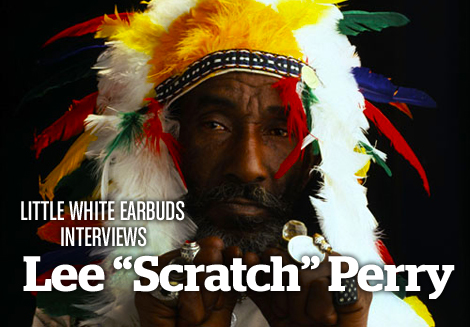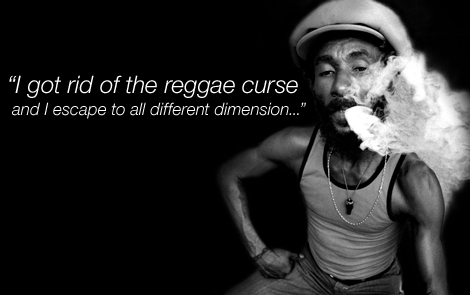
Despite the fact that to many, Lee “Scratch” Perry is a madman and a ranting eccentric who has spent a good deal of his life enshrouded in a cloud of ganja smoke, he is also by all accounts a musical genius. Born Rainford Hugh Perry in 1936, the diminutive Jamaican started out in the music business in the late 1950s, working for one of Clement “Coxsone” Dodd’s sound systems. He graduating to his Studio One compound where he helped with all manner of tasks including the arrangements and production on some of his most notable hits of the era. Differences saw Perry depart to work for rival Joe Gibbs where the pattern repeated, leading Perry to strike out on his own, setting up his own Upsetter label and recording the 1968 hit song “People Funny Boy,” which was a direct attack on Gibbs. Although Perry had already recorded a handful of singles it was “People Funny Boy” and “The Upsetter” (a dig at former boss Dodd) that helped establish Perry as a producer, the former not only notable for its use of samples but also for its quickened, rhythmic beat which would soon be coined reggae. With his studio band The Upsetters, Perry rapidly established himself as a major force in the Jamaican music industry, leading to him becoming highly sought-after as a producer by many artists.
During his most prolific period at his famed Black Ark studios, Perry not only helped artists like Bob Marley and The Wailers reach international acclaim but also invented dub through his creative use of the mixing board. His modest recording equipment stood in stark comparison to the top studios of the day, but Perry used this to his advantage via inventive production techniques that resulted in some of the most memorable songs ever recorded in these genres. After his beloved studio burned to the ground in the late 70s, Perry went into exile, eventually settling in Switzerland. Although his output in more recent years has largely relegated him to the role of vocalist rather than producer, his latest album, The Orbserver in the Star House, a co-production with The Orb, sees Perry at work on the mixing board as well as the microphone. Little White Earbuds called this living legend at his home in Switzerland for a typically cryptic yet enlightening talk about the album, reggae vampires and his tips for staying strong and healthy.
Can you tell us about the new album that you’ve done with The Orb?
Lee “Scratch” Perry Well, they call me and ask me if I want to do it so I say that we try it and see what happen. So we do it and I don’t know, maybe people do like it. [laughs]
Well, I think they will like it, there are elements of you and of the Orb in there. How did the recording work with them? I understand that it was truly collaborative and you were in the studio with them.
I don’t have much to do with the riddim now, I just sing on the riddim that the artist they make. But they say they want me to get in on the riddim and do some arrangement so I did. It’s good to listen to other people idea sometime because I was in this reggae business all my life, and I see many people without reggae and I put my name on it and I really wasn’t on it. So all of the reggae pirates said, “When you going to escape out of this reggae trap?” So you see this is the real thing without the reggae pirates. I got rid of the reggae curse and I escape to all different dimension, to the original dimension and Jesus Christ dimension and Haile Selassie dimension.
So they’ve helped you get out of the reggae curse then because they’re more of an electronic band?
The reggae business is Obeah, the Obeah fear. It for Obeah people and take away dem other people poor or something like that. So I say what am I going to do because I love music and my God said to me, “But your soul is music so why you don’t you make music from the soul?” So I make soul music and then I not be in the reggae Obeah business. So that is how I escape the reggae music and the black magic with the herbs. Some black people they love it. [laughs]
A lot of people still love it. The reggae music that you made has been very uplifting.
I know, but I was tired of people using my name and not to put me on but to try to get their way to the top. Dem make a Bob Marley film and I don’t get to even say anything in the film, all I could say is, “He a genius,” so why can’t I say something to the people, nah just say he a genius ’cause that nothing they nah never heard before. That would mean Bob Marley would be using me, and all the reggae promoters are all users, and all the reggae producers are all users, so I don’t know but I think the reggae music is a curse now, actually. But if there is a curse then we have the soul music to defend us. We believe in soul music.
Was soul music a big influence for you, hearing the early soul music being brought over from America?
Gladys Knight, The Temptations, Otis Redding. These people were amazing to me because they are spiritual singer, and I believe in spiritual singer. I believe in soul singer, I believe in rock and roll singer. But I love dem soul singer and when I hear music like that it make me want to hear something with soul. But the Jamaican people they love this music so then they start wanting to make this soul music, but they make it — they can’t call it soul so they have to call it something else and they call it reggae music.

You made your name as a producer but more and more now you’re a vocalist on albums produced by others. Why are you working like this instead of producing your own albums?
Well, you know, that’s what they do in the reggae business. They take your music and they copy it over and make it over and before you have anything to say to them, they say it’s presented by you. So in the reggae business there works in it too much pirate, too much teeth, too much grief, too much bad no-conscious-in-it jinx.
OK, but then what can you tell us about the album you’ve been making with Daniel Boyle who has recreated the Black Ark studio which you’re recording in?
Sound good. It’s going to be very good. Very good.
OK, when you started making music all of the equipment you had was analog equipment so how — ?
Well, me didn’t want to have what all the other people have, so when I start to make music I buy what is for home stereo, just for use in the home. So I don’t make the music on big speaker because that nah what they have in the home. And they have big 24-track mixer, I have four-track mixer. I started with a two-track and a four-track TEAC, Japanese made. Marantz amplifier from Japan, TEAC from Japan. That’s how I get that sound. Dem Japanese badman with sound. [laughs]
What do you think of the digital studios now compared to your old setup?
What them making now, in my days you can do more and you can do better because I know them have a program they need, and it’s so slow. You wait so long to do anything it makes you want to go home. They got so many things just to make it easy, but they just make it harder. Too much choice and too much distress with the recording equipment they use now. Too much stress with all the producers. Too much stress with all the promoters. Too much stress with all the equipment. They all going down. I feel stress when I go on tour with stress reggae music and stress producer and stress reggae player and stress reggae singer. So when I feel this I get vexed and complain, but I don’t use the stress. I’m allergic to stress, I’m not addicted to stress. I’m allergic to distress, I’m not addicted to marijuana.
You’ve been involved in the music business for over 40 years now, but you still release a lot more music than most younger musicians. What keeps you so active and interested in music? Do you see music as a vehicle to praise God?
Music is a matter of judgement. And we are talking on more than one tangent. Judgment was from Psalms one and reggae is judgment music. So in reggae you got all of the problems that you have in judgement: judge each other, kill each other, stab each other, and shoot each other.
Sadly many of your contemporaries are no longer with us, but you are still very much in good health. What is your secret to good health and a long life?
Read the Bible. Read Psalms one. It said blessed is the man who walk not in the concert of the ungodlies. Neither does he seek of the scornful, nor does he walk in the way of the sinner but he delights in the way of the true and living God who is not fake. If your true and living god is not a fake, then have no fear. A true and living god does not have nah natty hair. A true and living god not have nah dreaded hair. A true and living god not have nah locks and nah have to pay nah tax. Dub, love, fishes, and fresh air, ice and fire. And boom on the head. Boom. You hear it? You want to hear the boom? See, this is the boom here. [noise in the background of Perry hitting something] You hear it?
I hear the boom.
Good. You hear it?
I hear the boom inside of me. I hear the boom in my heart and in my blood.
Good. Thank you very much. If you can’t see it, hear it.













The man!!!!
Enjoyed that, thanks
This mans contribution to music can not be over stated. A true legend.
“Despite the fact that to many,…” blah blah blah
Then why even mention it in the first place?
Fueling pointless negative stigma… so tired.
Danny I mentioned it precisely because it’s a commonly held view. For someone who knows little about Perry this intro would also serve as an introduction to him, therefore it’s important to present this reader with an even account of the man and his life.
If you’d read past those first six words you’d have gathered that I don’t see Perry in this light at all, rather that I think he is a genius. I would consider this to be fueling a positive view of the artist.
You are correct. Apologies. Great interview.
[…] Perry: What them making now, in my days you can do more and you can do better because I know them have a program they need, and it’s so slow. You wait so long to do anything it makes you want to go home. They got so many things just to make it easy, but they just make it harder. Too much choice and too much distress with the recording equipment they use now.†(http://www.littlewhiteearbuds.com/feature/lwe-interviews-lee-scratch-perry/#.UTJxnKVmaoY) […]